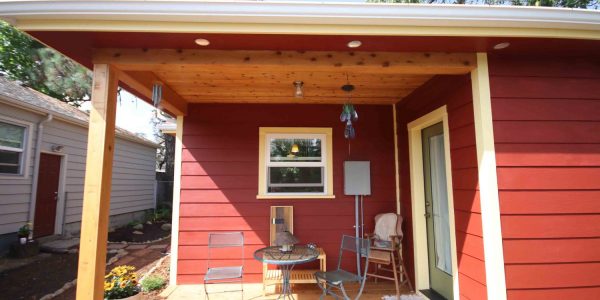Size Matters: How ADUs Can Help Prevent Waste

Although the unofficial American mantra seems to be “Bigger is Better”, thankfully there is a strong cultural trend swinging the other way towards downsizing. And while tiny homes aren’t for everyone, they are assisting a cultural shift towards at least looking at, or considering, the idea of smaller space. What we put in it. What we hold on to. What we need versus what we want. What a larger space demands. How much is enough, and how much can be really too much. Because the bigger the house, the more stuff you put in it, the more heat you need to warm it, the more power you need to light it, the more money and time you need to maintain it.
So while tiny homes aren’t for everyone, one thing that has gained popularity around a similar idea is an Accessory Dwelling Unit. You know, the apartment over a garage. A small “mother-in-law” studio behind a larger single family house. There has been a surge in popularity in ADU’s for a multitude of reasons.
First, people usually go down this path for a long term income generator. They can be rented out as a vacation rental or a long term rental. But from a community perspective, ADU’s offer flexibility. A family could live in the larger house and rent out the ADU, maybe they take over both residencies as their family expands, and then when it’s empty nest time, maybe the older couple downsizes to the smaller residence, taking advantage of renting out the larger one for continued income into their twilight years. This allows a family residence to expand and contract, without building bigger houses.
On the renter side, ADU’s offer a smaller living space that may meet the needs of singles, couples, or even small families. In a time when Bend has an extremely low vacancy rate, and yet is growing and building large homes, there are fewer options for renters. Building ADU’s creates housing opportunities within many walkable neighborhoods through infill, rather than pushing housing out to the edges.
What does any of this have to do with rethinking waste? Oregon DEQ has done a lot of research into how the size of your home (including what it’s made out of, how it’s heated and powered, and how you behave inside of it) which points to one of the biggest ways you can prevent waste: choose to build/buy/rent and live in a smaller home.
For those that really enjoy geeking out on this kind of stuff, check out this report: A Life Cycle Approach to Prioritizing Methods of Preventing Waste from the Residential Construction Sector in the State of Oregon. The report states that
“materials from construction, remodeling, and demolition projects are a significant contributor to waste in Oregon, and buildings themselves and the materials used to make them have significant environmental impacts. Using lifecycle analysis, DEQ evaluated waste prevention practices (reduction or reuse of materials) in residential buildings to determine which practices have the largest environmental benefits over the life of a home. Results indicated that among the 30 different material reduction and reuse practices evaluated, reducing home size and multi-family living achieved the largest greenhouse gas reductions along with significant reductions in other impact categories.”
In other words, size matters: you can have a smaller footprint in a regular smaller home than you often can in a super green but very large home, and ADU’s are one way to build intentionally smaller living spaces.
Interested in learning more? Lucky you, there is an ADU focused Green Drinks coming up this Thursday, followed by an ADU workshop in May with Portland ADU expert Kol Peterson. If you’re serious about looking into building an ADU, or just want to check out some small space eye candy, his website Building an ADU is chock full of images and resources.
I was wondering if you were able to give me a referral on a clothes repair person. I noticed you have had one before on your repair cafe sessions. I’d like to repair an item and would like to do it sooner than your spring date. Of course, I would pay this referral for their talent. Thank you!
Hi Teri,
We have 2 professional sewers that volunteer for our events. I will email you their contacts to follow up with them.